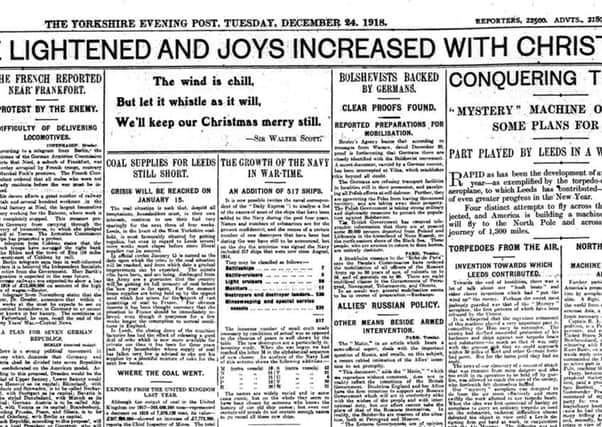Peace at last - Christmas in 1918


In the days and weeks following the announcement of the Armistice on November 11, 1918, a wave of euphoria and relief swept the nation, as more than four long, harrowing years of war finally came to an end.
Then on December 14, David Lloyd George, who had led the country for the previous two years, won a landslide victory in the General Election on the back of his campaign pledge to make “a country fit for heroes.”
Advertisement
Hide AdAdvertisement
Hide AdThe election was notable, too, for the fact that some women, providing they were over 30 and they or their husbands were owners of property, were able to vote in a general election for the first time. It meant that 8.5 million women were eligible to vote thanks to the Representation of the People Act.
As Christmas approached there was a sense of hope and renewal following the trauma of a conflict that claimed the lives of just over 700,000 British soldiers.
It’s little surprise that headlines of “Christmas in peace” could be found inked across the front pages of newspapers in December 1918. Including the Yorkshire Evening Post, whose Christmas Eve edition ran with: ‘May Sorrows Be Lightened And Joys Increased With Christmas.’
Beneath this sits a quote from the poet Walter Scott which reads:
The wind is chill,
But let it whistle as it will,
We’ll keep our Christmas merry still.
Advertisement
Hide AdAdvertisement
Hide AdThere was an added poignancy to Christmas a century ago – the first in five years without the shadow of war smothering it.
The newspaper offered good cheer to its readers, while another article reflected the anger felt by many people towards Germany: “Probably no happier time was ever looked forward to in the Allied countries – the lands of victors. The contrast with the conditions in the defeated countries – Berlin is dismal, Vienna near starvation – is emphatic, and inevitable.”
It contrasted Leeds, where with its “crowded streets” and “the hum of business”, with an article from a Daily Chronicle correspondent which said: “Christmas in Germany this year will be the most pathetic, without doubt, of the five since war broke out. Almost everything which is associated with the greatest of all festivals is absent.” Adding that “the dull atmosphere of defeat” hangs over the country.
The Leeds Mercury’s December 24th edition opted for a positive outlook, reporting that “Christmas shopping” in Leeds was “still brisk” with plenty of chickens available but few turkeys.
Advertisement
Hide AdAdvertisement
Hide Ad“Shopkeepers will remember this “Victory” Christmas as one of exceptionally good trade, despite the prevailing high prices for both luxuries and necessities,” it said.
“The shopping crowds have been plentifully supplied with money which has been spent with a seasonable freedom accelerated by the atmosphere of rejoicing at the happy termination of the war.
“There was little flagging of the shopping fever in Leeds, yesterday, when fine, bright weather gave an appreciated cheerfulness to the streets.”
It reported, too, that this year’s pantomime - Robin Hood and the babes in the wood - had just opened to a packed house at the city’s Theatre Royal.
Advertisement
Hide AdAdvertisement
Hide AdHowever, the war continued to claim more victims even though the fighting had stopped and on the same page was a story noting that Jack Bellimore, of the 2nd Battalion West Yorkshire Regiment, had died of his wounds in Germany after being taken prisoner in March that year.
The article included an appeal from his father who would be “indebted” to anyone who could shed light on the circumstances of his son’s capture and death.
There was also the realisation that the men at the Front wouldn’t be returning home for Christmas – for some it would be many months before they returned back to England.
Dr Jessica Meyer, Associate Professor of Modern British History at the University of Leeds, points out that for places like No. 2 Northern General Hospital, in Leeds, nothing had really changed.
Advertisement
Hide AdAdvertisement
Hide Ad“Hospitals like the Northern General Hospital, and the other military general hospitals all around Yorkshire, still had a lot of seriously injured patients,” she says.
There were festive celebrations in most hospitals. “There would have been a meal for the men, the wards were decorated and the local community had carol singing with school children coming in. There was various forms of entertainment. In Leeds there was a fund set up to pay for concert parties throughout the year and they had special concerts at Christmas.”
The relief that the war was over was tempered by the fact that people were still dying and Spanish Flu continued claiming lives. “For a lot of medical personnel at Christmas there would have been a lot of hard work, rather than celebrations, because they were looking after the sick and those with long term injuries.”
As Dr Meyer says, any joy people felt would have been diluted. “The emotion would have been one of relief but not necessarily wild celebration.
“Christmas would have seemed less ironic, though civilian life hadn’t returned to normal. It would have felt like other wartime christmases just with this added sense of relief.”